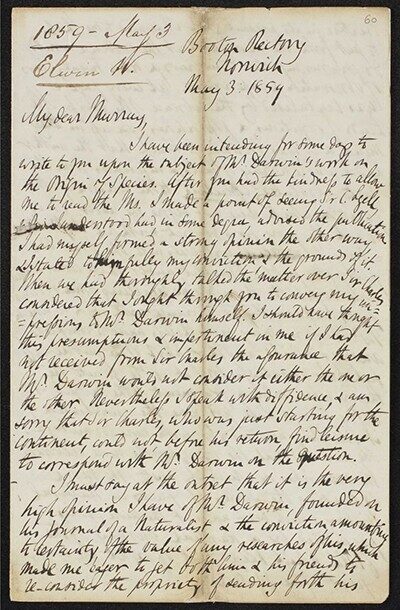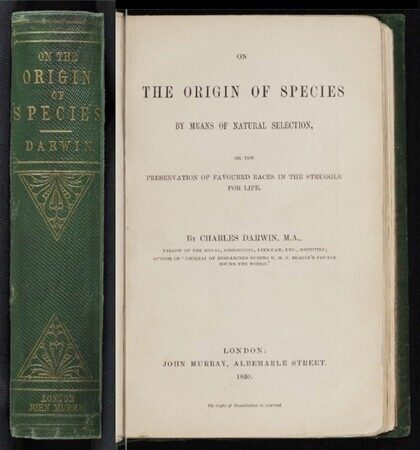Publishing history, or On the Origin of Pigeons
When hard-drinking former marine John McMurray invested his wife's fortune in a bookselling business in 1768, he could hardly have known he would be kickstarting a publishing dynasty that would span more than 200 years, countless bestsellers and seven generations - all named John. How could he possibly comprehend, then, the mark his fledgling business would leave on literary history?
This month AM launches Nineteenth Century Literary Society: The John Murray Publishing Archive. Held by the National Library of Scotland since 2006, the John Murray Archive was added to the UNESCO Memory of the World Register in 2011, reflecting the extraordinary value of the collection as a repository for book history. As the publishers of literary luminaries including Lord Byron, Herman Melville and Jane Austen, the Murray firm was responsible for publishing some of the best-known authors of the century, alongside genre-defining explorers, archaeologists, politicians, scientists, critics – even self-help gurus and cooks.
One tale from the archive illustrates the power a publisher wields to make history. By the Spring of 1859, noted scientist, Charles Darwin, had made his mind up to publish his theory of evolution after twenty years of work. On the advice of a friend, Sir Charles Lyell, he reached out to John Murray III who eagerly snapped up the proposed work - a work of which the author bashfully admitted, "Only some small portions are at all abstruse." Murray passed the initial drafts on to his long-term reader, the Reverend Whitwell Elwin.

Letter from Reverend Whitwell Elwin to John Murray III © The National Library of Scotland. Further reproduction prohibited without permission.
Amongst thousands of pages of ledgers, proofs, advertisements and correspondence digitised in this new resource, we find the response. Elwin held the scientist in high esteem, but was flummoxed by Darwin’s draft, and, in particular, what he saw as a lack of detailed evidence:
“At every page I was tantalised by the absence of the proofs. … it was fretting to think that the author had a whole array of facts, & inferences from the facts, absolutely essential to the decision of the question, which were not before the reader. It is to ask the jury for a verdict without putting the witness into the box.”
In conversation with Lyell, Elwin surmised that the patchy draft was the result of Darwin’s rush to publish ahead of his rival, Alfred Russel Wallace, who was working on his own theory. The pair concocted a plan. Darwin, they argued, should publish a short piece on the evolution of pigeons to illustrate the general principles of his theory. As Elwin pointed out, “Everybody is interested in pigeons.”
The suggestion was not as insincere as it may seem to the modern reader; though much maligned today, the humble pigeon underwent something of a renaissance in Victorian Britain and pigeon-adjacent pastimes became the favoured hobby of many fashionable gentlemen of the period.
Thankfully Murray disregarded the recommendation and instead worked tirelessly to coax Darwin through the writing and publication of the 502-page work that became On the Origin of Species. Today, the book is considered one of most important literary titles of all time; presenting Darwin's ground-breaking theory of natural selection, it became the foundational work of evolutionary biology and has, since the day it hit shelves, shaped scientific thought and religious doctrine across the globe.

Composite image, File copy of the first edition of "on the origin of species by means of natural selection" @The National Library of Scotland. Further reproduction prohibited without permission.
This is just one brief example of the way successive Murrays shaped the books that shaped the narrative of the nineteenth-century society. By producing the works of writers such as Darwin, Livingstone and even the mad, bad Byron, they not only made publishing history, but made history. Would the treatise On the Origin of Pigeons have had quite the same impact on the world? You have to wonder.
Recent posts

The blog highlights American Committee on Africa, module II's rich documentation of anti-apartheid activism, focusing on the National Peace Accord, global solidarity, and student-led divestment campaigns. It explores the pivotal role of universities, protests, and public education in pressuring institutions to divest from apartheid, shaping global attitudes toward social justice and reform.

This blog examines how primary sources can be used to trace the impact of young voices on society, particularly during pivotal voting reforms in the UK and the US. Explore materials that reveal insights into youth activism, intergenerational gaps, and societal perceptions, highlighting their interdisciplinary value for studying youth culture, activism, and girlhood across history.
